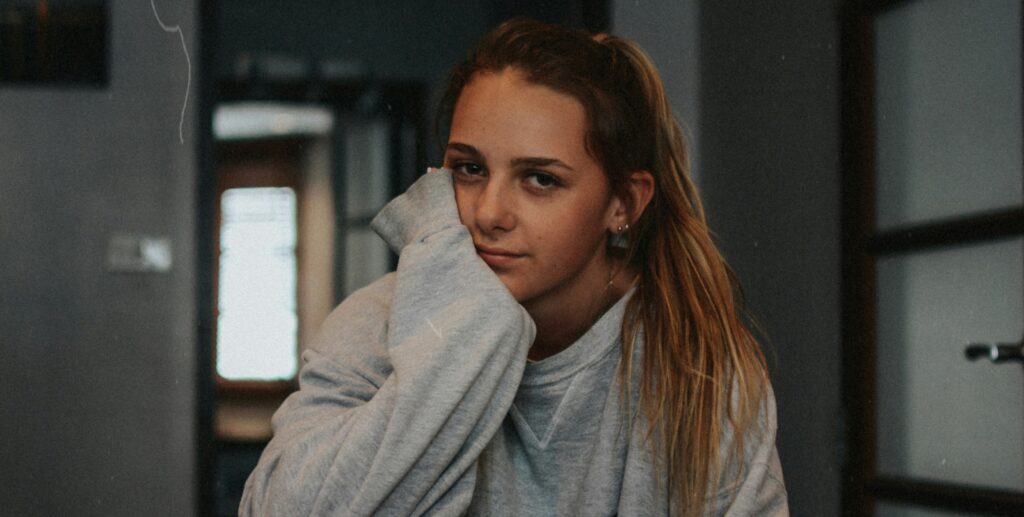Drug and alcohol use tends to begin at an early age. It is a fact, your child will be exposed to drugs and alcohol in some form or another throughout school and beyond. This is no reason to panic, but to keep a lookout and protect your child when you see any signs your kid is using drugs.
Need help getting addiction treatment?
If your kid is using drugs or drinking alcohol, young adult addiction treatment programs help them get back on track.
Reach out to our teen addiction treatment program at 833.604.1287 for help from recovery experts.
How Do I Know If My Kid Is Doing Drugs?
If your child’s grades started to plummet around the time you noticed changes in their behavior, you may be looking at one of the common consequences of drug addiction or abuse. If your kid goes from being a straight-A student to getting F’s or D’s, something’s changed. Of course, it could be linked to a number of factors other than kids doing drugs, so make sure you explore other causes.
The following are 10 signs your teen is using drugs:
1. The 1000-Yard Stare
Glazed expressions may be a sign of addiction, but with some teens, it’s hard to read signs your kid is on drugs. Teenagers and twenty-somethings tend not to be the most communicative of creatures, but if your kid starts looking stoned all the time and is accompanied by any of the other factors listed, it’s entirely possible he or she is stoned.
2. Abandoning Friends or New Friends
Fairly common throughout the teenage years, but it could have a more sinister implication. If your kid starts hanging out with a different crowd who smoke and so on, it could be a phase, but it could be linked to drugs.
3. Abandoning Social Activities
Another potential sign of drug abuse. Kids who are doing drugs would rather do that than almost anything else. Again, interests change throughout your kid’s formative years, so tread lightly. It might just be related to a change of tastes.
4. Evasive Answers to Questions
If your kid can’t tell you for certain where they’ve been, that can sometimes mean they’re using drugs. Monitoring them while they’re out might seem like meddling, but any child living under your roof is subject to terms and conditions that you set.
5. Moodiness and Changes in Behavior
Moodiness and abrupt behavioral changes are quite common with kids who take drugs. The moody teen is a stereotype, as it turns out, is true. But if you notice that your child is jittery in the morning and calmer in the evening, these could be warning signs your child is on drugs.

6. Memory Problems
Issues with memory or an inability to pay attention can sometimes be signs of drug use in teens. While everyone forgets things here and there, if your child has problems remembering basic things, you might need to examine this. Of course, it could also be a sign of medical issues, such as ADHD.
7. Unexplained Injuries
A child with unexplained injuries can be related to drug or alcohol use. Just as above, however, they could also be related to medical issues or even bullying.
8. Missing Objects or Money
Missing objects around your house might mean that your child might be stealing to fund a habit. Tread lightly here, as it’s just as likely to be a partner or friend stealing them.
9. Weight Changes
An increase or decrease in weight is a normal part of teen life, but rapid fluctuations could indicate an addiction. Some teens neglect to eat due to drugs or spend lunch money on addiction rather than eat. If your child was always heavy and then, suddenly seems to have lost a great deal of weight, you should investigate further.
10. Running with the Wrong Crowd and Staying Out Late
Staying out late with friends and breaking curfew might seem like typical teenage habits, but in combination with things listed above, it’s possible that this could be an indication of drug abuse. Of course, it’s most likely that the drug of choice is alcohol in this case. A parent’s instincts are usually pretty good. If your kid seems to be running with the wrong crowd, you should start monitoring the child’s behavior, recreational habits, and time out of the house as well as using some investigation methods for spotting signs your kid is using drugs.

How to Spot The Signs Your Kid is Using Drugs
Most parents we meet tell us that they wish they knew the signs their kid was using drugs, and want to know common signs like how to tell if your kid is high. With a bit of training, you can begin to recognize the warning signs. First off, experts agree that you should have some sense of what’s going on by examining certain elements of their daily life and most of all, use your senses.
If you suspect that your child is using drugs, a process of observing, investigating and monitoring your child is the first step. If you’re seeing strong signs of addiction, the next discussion with your child should be very direct – ask them point-blank if they’re using substances. If you have any doubt, go to a local drug store and buy an in-home drug test kit. It is your right as a parent to demand that any child living under your roof submit to a drug test. The following list should help you as a parent know how to tell if your kid is on drugs.
Use Your Nose to Find the Signs Your Teen is Using Drugs
One sniff of your kid’s laundry should tell you a lot. Marijuana and cigarettes have strong odors that are difficult to hide. At the very, very least, you should be checking your child’s laundry. Odd smells are a pretty good reason to arouse your suspicion. It could be a new interest in deodorant or a heady smell of marijuana-laced smoke. If you don’t know what marijuana smells like, it’s time to educate yourself. We don’t suggest smoking it yourself, but you may be able to ask a friendly cop to show you a sample.
Look Them in the Eyes
When your child gets home after going out with her friends, take a close look. Pay attention to his or her eyes. Eyes will be red and heavy-lidded, with constricted pupils if they’ve used marijuana. Pupils will be dilated, and he or she may have difficulty focusing if they’ve been drinking. In addition, red, flushed color to the face and cheeks can also be a sign of drinking.
Do They Have a Car?
Check their car, too. Smell the inside of the car, check the ashtray (if your car has one) and look for evidence of drug paraphernalia, marijuana residue, rolling papers or other items that are questionable. Check every pocket, in every corner, under the floormats front and rear, in all the armrest pockets and in the trunk, including under the trunk mat.
Watch for Mood Changes
How does your teen act after a night out with friends? Are they loud and obnoxious, or laughing hysterically at nothing? Unusually clumsy to the point of stumbling into furniture and walls, tripping over their own feet and knocking things over? Sullen, withdrawn, and unusually tired and slack-eyed for the hour of night? Do they look queasy and stumble into the bathroom? These are all signs that they could have been drinking, using marijuana or signs of pill addiction.
Check their Bedroom
This includes drawers, under the bed, in their desk, in high, hard to reach places and inside of any tin, box, bag, container, including video game boxes, DVD cases, and so on. Paraphernalia for drug use include roll-ups and tin boxes. For other drugs, it could be syringes and burnt teaspoons. If you see a tin box, open it and take a sniff. If it smells like tobacco, it probably is. When you find something that has an unidentifiable smell, ask your kid about it.
Look for Signs of Tobacco Use or Vaping Pen Use
When children or young adults start smoking or vaping, chances are high that they learned it from someone else. If not a parent or from family members, then a peer. And if your child’s peers are using tobacco or vaping, there’s a good chance that they may be using marijuana. Smoking and marijuana usage are gateways to further experimentation with illicit substances. These are also great steps to take if you’re also wondering, “how do I know if my child is exposed to drugs”.
These things are the bare minimum you should be checking. If you’re not willing to do at least these things, you’re not doing all you could be doing. Remember that any child living under your roof is subject to your rules and conditions. They have no rights and no say as to what you as a parent deem to be acceptable when it comes to monitoring their behavior for signs your teenager is on drugs. You must also remember that you’re their parent – not their friend – and as such, there should be little discussion or negotiation as to what you as a parent will accept.
GET HELP NOW
What to Do if Your Kid is Using Drugs
Renaissance Recovery is a rehab in California that utilizes evidence-based treatment such as medication-assisted treatment and dual diagnosis treatment to help all those struggling with addiction. If your child is using drugs or misusing prescription drugs, contact Renaissance Recovery for guidance. Bringing in a trained professional can be the difference between your child pulling farther away or getting the help they truly need. Our caring addiction specialists may recommend any of the following depending on the signs your kid is using drugs:
- Partial hospitalization program
- Intensive outpatient rehab
- Medication-assisted treatment
- Holistic therapy
- Specialized substance abuse treatment
Call our team today at 833.604.1287 and we can walk you through how to tell if your child is using drugs and what you can do to help the situation and get the sobriety process started.

Teen Addiction FAQs
How do I know if my child is addicted to drugs?
Recognizing addiction in a child can involve observing significant changes in behavior, such as mood swings, withdrawal, declining academic performance, and secretive actions. Physical signs, like bloodshot eyes and changes in appetite or sleeping habits, may also indicate a problem. If you suspect your child may have a drug addiction, seeking professional help and support from healthcare providers or addiction specialists is crucial.
What are four symptoms of teen drug abuse?
Four symptoms of teen drug abuse can include changes in behavior such as sudden mood swings, decreased motivation, and social isolation. Physical symptoms may include bloodshot eyes, unexplained weight loss or gain, and frequent illness. Neglecting responsibilities, experiencing financial difficulties, and having problems with relationships or legal issues are also common signs of drug abuse.
Can parents tell when kids are high?
Parents may be able to recognize signs that their kids are under the influence of drugs or alcohol. Some common indicators of substance abuse include changes in behavior, such as unusual mood swings, slurred speech, impaired coordination, and altered perception. Physical signs like bloodshot eyes, dilated pupils, and unusual odor may also be noticeable. However, it is important to note that the ability to detect substance use can vary depending on individual circumstances and the substances involved.
THERE IS ALWAYS HOPE
At Renaissance Recovery our goal is to provide evidence-based treatment to as many individuals as possible. Give us a call today to verify your insurance coverage or to learn more about paying for addiction treatment.



